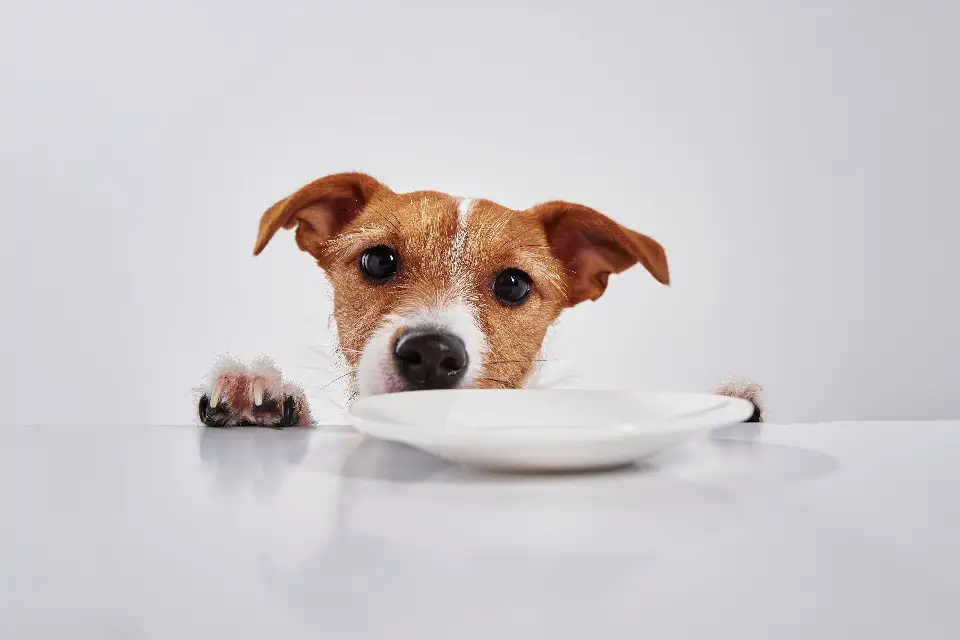Your Jack Russells need certain nutrients in their food to help them live a long and healthy life.
When you feed your dog the wrong types of foods, you run the risk of overloading their system with toxins that aren’t good for them. This can lead to conditions such as liver disease, kidney failure, cancer, and other serious issues.
Feeding your Jack Russell any of the food from this list of what Jack Russells can’t eat, can lead to health issues, so be sure to take note of them when you plan for your dog’s diet.
Chocolate
You should not feed your Jack Russell chocolate. Chocolate contains theobromine, which is toxic to dogs and can cause potentially fatal seizures.
Dark chocolate is more dangerous than milk chocolate because it contains more theobromine and less sugar, fat, and milk solids.
Cocoa bean shells also contain some theobromine, but not as much as the actual chocolate itself. The darker and less processed chocolate is, the more dangerous it will be for your Jack Russell.
Grapes and Raisins
Grapes and raisins are toxic to dogs because they contain a chemical known as grape seed extract. This substance can interfere with the nervous system causing weakness, vomiting, breathing difficulties, and even death in some cases.
Symptoms of grape poisoning usually appear within 12 hours of ingestion but may take longer to appear depending on the number of grapes or raisins eaten by your dog.
Almonds
Almonds, while not toxic to canines, aren’t easy for dogs to digest. In addition to the almond itself, almonds contain cyanide which can create issues in dogs.
While small quantities of almonds won’t cause deaths, they are more likely to cause vomiting or distress in dogs.
Macadamia Nuts
One of my favorite snacks is the macadamia nut – I just love their rich, buttery taste. But macadamia nuts aren’t as dog-friendly as you might think.
Jack Russells have been known to be susceptible to macadamia nuts. As a matter of fact, several dogs have had to undergo emergency treatment for the ingestion of macadamia nuts. The main symptoms noticed in dogs eating macadamia nuts are weakness in the back legs, vomiting, and diarrhea.
Garlic
Garlic contains a chemical known as thiosulphate which is toxic to dogs. This chemical irritates the stomach and intestines causing vomiting, diarrhea, and stomach pain.
The chemical might also cause gastrointestinal bleeding especially if the dog has eaten garlic regularly for an extended period of time.
Onions
Onions contain the chemical thiosulphate which irritates the stomachs of dogs causing nausea and vomiting.
Onions also damage red blood cells which makes them more susceptible to infection from bacteria and other microorganisms.
White onions are not as harmful as yellow onions but should still be avoided because they can cause stomach irritation in dogs.
Hops
Hops are a crop that’s used in beer making. As they pertain to dogs, it can create very dangerous, very high temperatures in furry friends.
Since this substance is normally found in a lot of different foods — and even sold as a supplement to treat anxiety — it’s important for pet owners to know about the dangers it poses to our beloved canine companions.
Avocado
A common rumor is that Jack Russell terriers can eat avocados without any negative side effects. This is true, to an extent. Jack Russells can eat avocados, but they may cause some minor health problems.
Avocado contains a chemical known as persin which is toxic to dogs. This substance can lead to various symptoms including vomiting, diarrhea, drooling, lethargy, and heart problems.
Egg Whites
Unfortunately, Jack Russells can not eat egg whites because they contain avidin. Avidin is a protein that binds to biotin in the body and prevents your dog from absorbing it. This can cause serious skin, coat, and health issues.
Rhubarb Leaves
Everybody knows that rhubarb is delicious in recipes, but did you know that it’s poisonous to pets?
The poisonous properties of rhubarb make it unsafe for dogs. While the stems are safe to be eaten by your dog, rhubarb leaves can cause serious excessive salivation, lethargy, and even kidney failure.
Dried Fruits
It’s best to avoid giving your Jack Russell any dried fruit because many of these will contain a chemical known as cyanide. If this substance gets into your dog’s system it can lead to gradual and serious tissue and organ damage.
Cabbage
The plants that make up the cabbage family contain a chemical called goitrogens. These substances can interfere with thyroid function and lead to hypothyroidism in dogs.
Symptoms of hypothyroidism include weight gain, dry skin, hair loss, and lethargy.
Corn on the cob
The truth is corn on the cob can be fatal for a dog. If your pet has eaten corn on the cob, don’t panic. Check the time that they ate it and get them to help as soon as possible.
Corn is digested inside the dog’s stomach, but part of the cob (the rough husk) passes through to the intestines. The corn is digested by enzymes in the dog’s stomach, but anything left over can make a dog really sick.
Cooked bones
Whether it’s chicken bones, turkey bones, or pork bones, you should never give a dog cooked bones as they can splinter and cause internal damage.
Large quantities of cooked bones can also cause your dog to become constipated or even worse, have serious stomach problems.
Chewing Gum
Chewing gum contains Xylitol which has become an increasingly popular sweetener substitute over the last few years. It is the most well-known sugar substitute that is toxic to dogs.
The specific symptoms and severity of xylitol toxicity vary based on your pet’s size, but with enough exposure, xylitol can be fatal.
Alcohol
Small amounts of alcohol could cause your dog to become intoxicated. This can lead to vomiting, diarrhea, increased heart rate, hyperactivity, and even death in extreme cases.
If you feed your Jack Russell alcohol he may become more excitable than usual and very thirsty. Some signs of intoxication include disorientation, loss of coordination, and a lack of balance.
Caffeine
Caffeine is found in coffee, tea, chocolate, and some soft drinks. This chemical affects the nervous system by increasing heart rate, causing restlessness, and making your dog more alert and agitated.
Conclusion
Dogs have different dietary needs than humans, and some foods just aren’t healthy for them. People tend to think that the closer a food is to the way it’s found in nature, the more nutritious it is for our dogs – but this isn’t always the case.
Please take note of the foods mentioned in this article, and avoid giving them to your Jack Russell.


